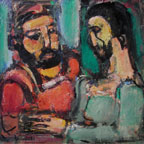Art and Transcendence: Reflections on a Rouault Painting
By John Kohan
 A belief in the transcendent power of art has been with us since the first cave-dwellers painted their walls with images. Modern Art was supposed to put an end to all that. Propagandists of pure abstraction insisted that an art work should refer to nothing but itself as a made object. It was a hard line to sell! For all the philosophical contradictions of this era of post-modernism, art lovers need not feel embarrassed anymore about going to museums in search of sublime feelings. Transcendence has come back--in a big way. But do secular viewers understand what they see in sacred works of art?
A belief in the transcendent power of art has been with us since the first cave-dwellers painted their walls with images. Modern Art was supposed to put an end to all that. Propagandists of pure abstraction insisted that an art work should refer to nothing but itself as a made object. It was a hard line to sell! For all the philosophical contradictions of this era of post-modernism, art lovers need not feel embarrassed anymore about going to museums in search of sublime feelings. Transcendence has come back--in a big way. But do secular viewers understand what they see in sacred works of art?
.jpg) Georges Rouault was once seen as a major figure in 20th Century Art, but the 50th anniversary of his death passed almost unnoticed. One reason for the neglect may be that in our era of "niche" marketing, Rouault refuses to be labelled. Never tempted by pure abstraction like his contemporaries, Rouault created representational art until the day he died. In a sceptical, secular age, he kept his faith.
Georges Rouault was once seen as a major figure in 20th Century Art, but the 50th anniversary of his death passed almost unnoticed. One reason for the neglect may be that in our era of "niche" marketing, Rouault refuses to be labelled. Never tempted by pure abstraction like his contemporaries, Rouault created representational art until the day he died. In a sceptical, secular age, he kept his faith..jpg) Lenten Reflections is a collection of paintings, drawings, and collages inspired by great Christian narratives like the Passion and Resurrection. The 29 pieces on show range in style and medium, with homage paid to El Greco, and the medieval Russian iconographer Andrei Rublyov; there are strong echoes of Baroque, and influences gleaned from the tiled wall decorations of southeren Spain along with exuberant religious art of the developing world. There are also a few modern, abstract studies.
Lenten Reflections is a collection of paintings, drawings, and collages inspired by great Christian narratives like the Passion and Resurrection. The 29 pieces on show range in style and medium, with homage paid to El Greco, and the medieval Russian iconographer Andrei Rublyov; there are strong echoes of Baroque, and influences gleaned from the tiled wall decorations of southeren Spain along with exuberant religious art of the developing world. There are also a few modern, abstract studies..jpg) Former TIME Bureau Chief John Kohan recalls his years in Moscow, reporting on Mikhail Gorbachev's ambitious perestroika reform program. Enjoying peace and quiet in his new home in Paphos, Cyprus, Kohan remembers the days when he used to watch the Soviet Leader commute to work from the window of his flat in downtown Moscow. The hardships of living in the USSR were a small price to pay to witness some of the most dramatic events in modern history.
Former TIME Bureau Chief John Kohan recalls his years in Moscow, reporting on Mikhail Gorbachev's ambitious perestroika reform program. Enjoying peace and quiet in his new home in Paphos, Cyprus, Kohan remembers the days when he used to watch the Soviet Leader commute to work from the window of his flat in downtown Moscow. The hardships of living in the USSR were a small price to pay to witness some of the most dramatic events in modern history.